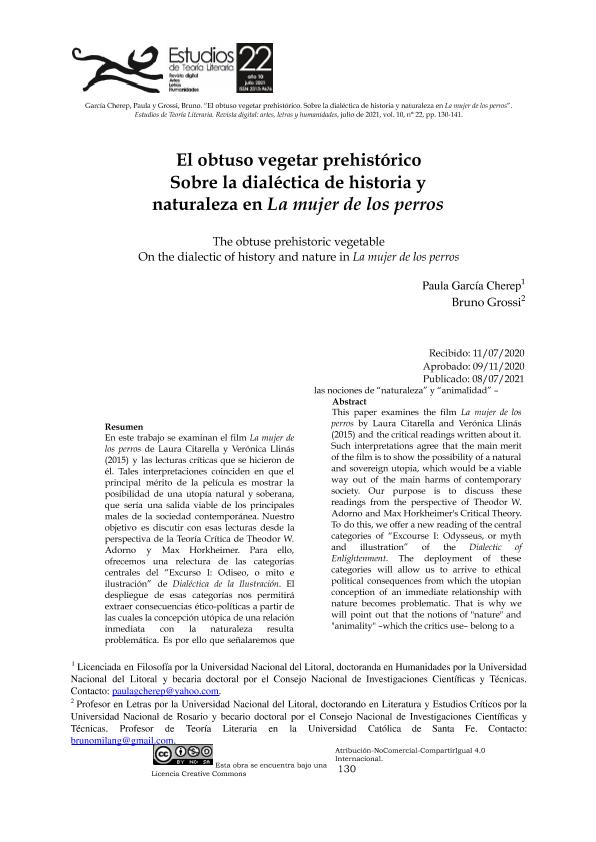Mostrar el registro sencillo del ítem
dc.contributor.author
García Cherep, Paula

dc.contributor.author
Grossi, Bruno

dc.date.available
2022-10-04T16:11:05Z
dc.date.issued
2021-07
dc.identifier.citation
García Cherep, Paula; Grossi, Bruno; El obtuso vegetar prehistórico: Sobre la dialéctica de historia y naturaleza en La mujer de los perros; Universidad Nacional de Mar del Plata. Facultad de Humanidades. Centro de Letras Hispanoamericanas ; Estudios de Teoría Literaria; 10; 22; 7-2021; 130-141
dc.identifier.issn
2313-9676
dc.identifier.uri
http://hdl.handle.net/11336/171771
dc.description.abstract
En este trabajo se examinan el film La mujer de los perros de Laura Citarella y Verónica Llinás (2015) y las lecturas críticas que se hicieron de él. Tales interpretaciones coinciden en que el principal mérito de la película es mostrar la posibilidad de una utopía natural y soberana, que sería una salida viable de los principales males de la sociedad contemporánea. Nuestro objetivo es discutir con esas lecturas desde la perspectiva de la Teoría Crítica de Theodor W. Adorno y Max Horkheimer. Para ello, ofrecemos una relectura de las categorías centrales del “Excurso I: Odiseo, o mito e ilustración” de Dialéctica de la Ilustración. El despliegue de esas categorías nos permitirá extraer consecuencias ético-políticas a partir de las cuales la concepción utópica de una relación inmediata con la naturaleza resulta problemática. Es por ello que señalaremos que de las que se sirven los críticos– son propias de una visión fetichizada, que vuelve necesario su revisión, atendiendo a la historicidad y el carácter mediado de tales conceptos.
dc.description.abstract
This paper examines the film La mujer de los perros by Laura Citarella and Verónica Llinás (2015) and the critical readings written about it. Such interpretations agree that the main merit of the film is to show the possibility of a natural and sovereign utopia, which would be a viable way out of the main harms of contemporary society. Our purpose is to discuss these readings from the perspective of Theodor W. Adorno and Max Horkheimer's Critical Theory. To do this, we offer a new reading of the central categories of “Excourse I: Odysseus, or myth and illustration” of the Dialectic of Enlightenment. The deployment of these categories will allow us to arrive to ethical political consequences from which the utopian conception of an immediate relationship with nature becomes problematic. That is why we will point out that the notions of "nature" and "animality" –which the critics use– belong to a fetishized vision, that it becomes necessary to review taking into account their historicity and the mediated nature of such concepts.
dc.format
application/pdf
dc.language.iso
spa
dc.publisher
Universidad Nacional de Mar del Plata. Facultad de Humanidades. Centro de Letras Hispanoamericanas
dc.rights
info:eu-repo/semantics/openAccess
dc.rights.uri
https://creativecommons.org/licenses/by-nc-sa/2.5/ar/
dc.subject
Animalidad
dc.subject
Teoría Crítica
dc.subject
Utopía
dc.subject
Naturaleza
dc.subject.classification
Otras Artes

dc.subject.classification
Arte

dc.subject.classification
HUMANIDADES

dc.title
El obtuso vegetar prehistórico: Sobre la dialéctica de historia y naturaleza en La mujer de los perros
dc.title
The obtuse prehistoric vegetable: On the dialectic of history and nature in La mujer de los perros
dc.type
info:eu-repo/semantics/article
dc.type
info:ar-repo/semantics/artículo
dc.type
info:eu-repo/semantics/publishedVersion
dc.date.updated
2022-09-16T13:44:29Z
dc.journal.volume
10
dc.journal.number
22
dc.journal.pagination
130-141
dc.journal.pais
Argentina

dc.journal.ciudad
Mar del Plata
dc.description.fil
Fil: García Cherep, Paula. Universidad Nacional del Litoral. Instituto de Humanidades y Ciencias Sociales del Litoral. Consejo Nacional de Investigaciones Científicas y Técnicas. Centro Científico Tecnológico Conicet - Santa Fe. Instituto de Humanidades y Ciencias Sociales del Litoral; Argentina
dc.description.fil
Fil: Grossi, Bruno. Universidad Nacional del Litoral. Instituto de Humanidades y Ciencias Sociales del Litoral. Consejo Nacional de Investigaciones Científicas y Técnicas. Centro Científico Tecnológico Conicet - Santa Fe. Instituto de Humanidades y Ciencias Sociales del Litoral; Argentina
dc.journal.title
Estudios de Teoría Literaria
dc.relation.alternativeid
info:eu-repo/semantics/altIdentifier/url/http://fh.mdp.edu.ar/revistas/index.php/etl/article/view/4364/5409
Archivos asociados
